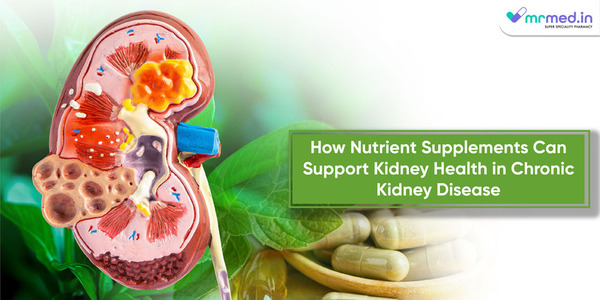A gradual decline in the function of your kidneys over a period of time is the hallmark of chronic kidney disease (CKD). The kidneys are essential for eliminating waste materials and extra fluid from the blood, maintaining electrolyte balance, and generating hormones that lower blood pressure and the growth of red blood cells. Waste materials and fluids build up in the body when kidney function is reduced, and can cause a number of problems and adverse effects on general health.
Chronic kidney disease (CKD) is a tough challenge in healthcare today. It needs a collaborative treatment approach that focuses on the kidneys as well as other health issues and nutrition problems. Various nutrients are important in helping manage CKD better. Let's find out why and how we use them throughout the journey of CKD.
Role of Nutrient Supplements in Kidney Health
There is a complex relationship between the food you eat and the progression of CKD. Factors such as your total weight (BMI), muscles, and body fat all matter. Studies reveal that CKD can worsen if you do not maintain these in good condition.
1. Vitamin D:
Many people with chronic kidney disease have low vitamin D levels because of inadequate kidney function, lack of sunlight, and potential dietary limitations. Vitamin D supplements are administered to maintain healthy bones, balance calcium and phosphorus levels, and reduce the risk of bone issues.
2. Calcium:
CKD can interfere with calcium absorption in the body, which in turn affects bones. So, along with vitamin D, calcium supplements are added to keep bones healthy and avoid fractures.
3. Iron:
Anemia (low red blood cells) is common in CKD because the kidneys don't make enough of a hormone called erythropoietin, resulting in iron deficiency. Iron supplements help replenish iron stores and boost red blood cell production, which helps with tiredness and weakness.
4. Omega-3 Fatty Acids
These can help with inflammation and heart health in CKD patients. But it is used cautiously since it can interact with other medications and may affect cholesterol levels. Omega-3 fatty acid supplements are frequently made from fish oil, which contains eicosapentaenoic acid (EPA) and docosahexaenoic acid (DHA).
5. Vitamins B:
Many CKD patients lack B vitamins like B6, B12, and folate, which can lead to anemia and nerve and heart issues. So, B vitamin supplements are recommended to fix these problems.
6. Erythropoiesis-Stimulating Agents (ESA):
Some CKD patients need ESA therapy and iron supplements to make more red blood cells and fight fatigue and weakness.
7. Phosphate Binders:
CKD can raise phosphate levels in the blood, causing bone and heart problems. Phosphate binder supplements can help lower phosphate levels by stopping the body from absorbing them. These medications bind to dietary phosphorus in the gastrointestinal tract, decreasing absorption and maintaining normal phosphorus levels.
8. Ketoanalogues:
Ketoanalogues of amino acids (KAs) are special types of amino acids that don't contain nitrogen. People sometimes follow what's called a "keto diet," which includes these KAs along with low-protein diets (LPDs) or very-low-protein diets (VLPDs). These diets help people with chronic kidney disease (CKD) reduce their intake of nitrogen without causing problems from not getting enough protein in their diet.
Studies have shown that these diets can be really helpful for certain CKD patients who stick to them well and have fewer health issues. They can slow the progression of CKD, prevent problems like high phosphorus levels or overactive parathyroid glands, and even help control blood pressure. And the best part is they can do all this without causing malnutrition.
A recent review of studies found that these special diets, along with KAs, could delay CKD from getting worse in people with stage 3 to 5 CKD who weren't on dialysis yet. It is like giving the kidneys a break and helping them function better while keeping the rest of the body healthy.
For example, a Ketosteril tablet is a nutrient supplement with an active ingredient, Alpha Ketoanalogue. This supplement is given along with a protein-restricted diet to delay the progression of chronic kidney disease (CKD). It reduces uraemic symptoms (caused by the accumulation of nitrogenous waste compounds normally eliminated by the kidneys), improves nutritional status, and reduces metabolic complications in CKD patients. It works by lowering urea levels in the bloodstream and slowing down the advancement of kidney disease, thereby delaying the need for long-term dialysis.
Conclusion
For effective management of chronic kidney disease (CKD), vitamins and other nutritional supplements are essential. We can improve diet and close nutritional gaps to assist CKD patients live healthier lives. Nonetheless, it's critical to treat every patient uniquely and keep abreast of the most recent developments in CKD research and therapies. Together, we can offer CKD patients hope for a future free from illness.




